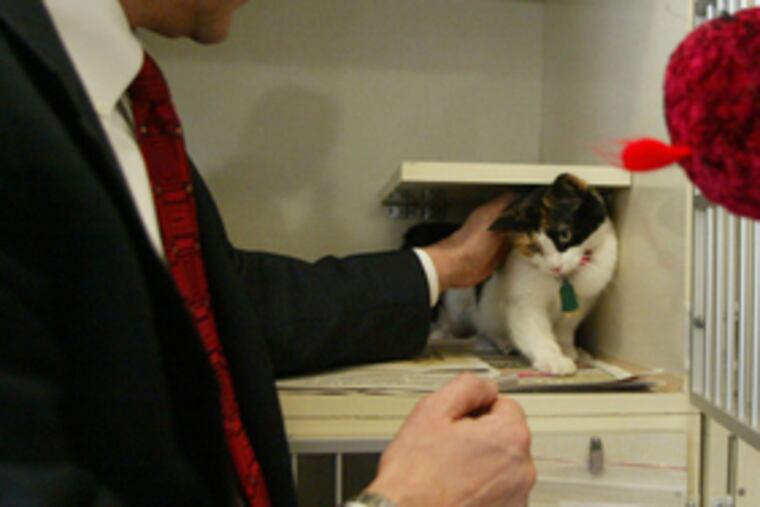Stu Bykofsky | New PSPCA head pledges 'no-kill' city
AFTER A nine-year absence, Howard Nelson has returned to Philly with a new job - and a mission to make life better for Philadelphia's homeless animals.

AFTER A nine-year absence, Howard Nelson has returned to Philly with a new job - and a mission to make life better for Philadelphia's homeless animals.
In fact, it should make life possible for more of them.
In his first local interview, the new CEO of the Pennsylvania SPCA gave me his vision of what he hopes to achieve, and how. He had left his job as executive director of the Washington (D.C.) Humane Society just 48 hours earlier.
He "absolutely" believes that in five years Philadelphia can become a "no-kill" city, meaning every adoptable animal gets a home. That is already the stated goal of the Philadelphia Animal Care and Control Agency (PACCA).
"If PACCA and PSPCA team up, we absolutely can do that, and dogs will be there sooner than cats," says Nelson. It's going to take money and "comprehensive, large-scale, low-cost spay and neuter" programs, something he was building at Washington Humane.
Through a program called the Good Home Guarantee, last May WHS met its goal of finding homes for every adoptable dog. Homeless cats will take a few years longer because they are so numerous, accounting for three-quarters of animals in shelters.
Nelson showed himself to be a great listener, good at building coalitions and adept at dealing with the "dynamics . . . in a large city with lots of players," says Becky Robinson, national director of Alley Cat Allies, with whom he cooperated.
That experience should serve him well in Philly, where dealing with dueling bureaucrats is like herding cats.
Nelson's No. 1 priority is the pet overpopulation that fills animal shelters and creates "heartache in this industry" when pets are put to death because there are more animals than homes.
To find homes for Philadelphia's homeless animals, Nelson pledges to work closely with PACCA, and with people involved in pet-rescue groups. "We will partner with all the other organizations doing great work in the city . . . so Philadelphia can be a flagship humane city," he says.
Nelson also expects SPCA to be a leader, including the current battle to close our state's despicable upstate puppy mills.
"We are going to step up to the plate," he says, and yearns for the day "when somebody writes an article and says Pennsylvania's not the 'Puppy Mill Capital of the East.' We clearly don't want that title," he says.
During our interview Nelson was "homesick" for his adopted girls - Emmy, 7, a 60-pound black lab, and Cali, 2, a 40-pound husky/shepherd mix. "I fostered [Cali] and rehabbed her back to health, and, of course I fell in love with her," says Nelson. His partner of 22 years, Marc Nasberg, who's in sales, was driving the dogs from their D.C. home to Philly that afternoon. The dogs will come to work with Nelson at the SPCA as they had in D.C.
A native of upstate New York, Nelson, 43, first came to Philly in 1985 to take a job with an accounting firm. He earned a master's degree in finance from Temple at night and then joined the Fannie Mae financial-services company. He was transferred to Washington in 1998.
While there, "I volunteered for several animal organizations, most importantly Labrador Retriever Rescue of Virginia," where "we did everything we could to get them adopted," he says. "It's always been a passion of mine. I even rescued baby raccoons when I was growing up," in Penn Yan, N.Y.
In July 2003, Nelson learned he had cancer of the abdomen and fought the disease, taking time off from work in 2004 to recover fully. In 2005, his lifelong love of animals became his career when he was hired to run Washington Humane.
Last year, when longtime Pennsylvania SPCA Executive Director Erik Hendricks decided to retire, the board reviewed dozens of resumés. Nelson was selected, according to board chair Mary Aull, because of his financial and administrative skills, and because he "had done phenomenal things at Washington Humane in a very short time."
His biggest accomplishment, says WHS interim Executive Director Ilene Steiman, was the Good Home Guarantee. "It's so great to be able to say to people we don't euthanize adoptable dogs," she says, adding that Nelson was a great boss who encouraged and challenged staff at the same time.
When our interview ended, Nelson and I visited the SPCA adoption center.
Cats and bunnies and hamsters were in cages, snakes in tanks.
Dogs of all sizes and shapes and makes were in clean pens.
Some cowered, abandoned house pets wondering what they had done to be so cruelly discarded. Others, tails wagging furiously and standing on hind legs, were dying for a pat on the head.
These are the innocent victims of pet overpopulation, human cruelty and human stupidity.
Nelson wants to do in Pennsylvania what he was doing in D.C. - guarantee homes for each of them. They deserve to live and Philly deserves to become a flagship humane city. *
E-mail stubyko@phillynews.com or call 215-854-5977. For recent columns: